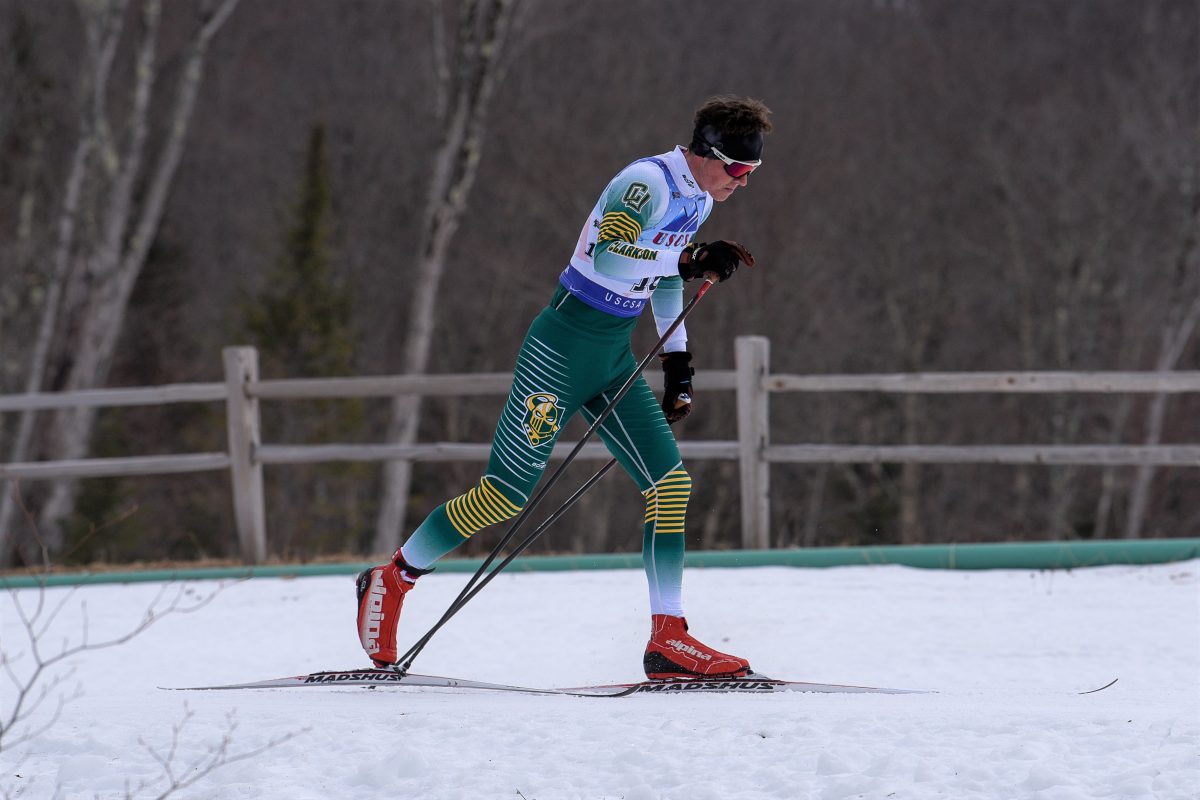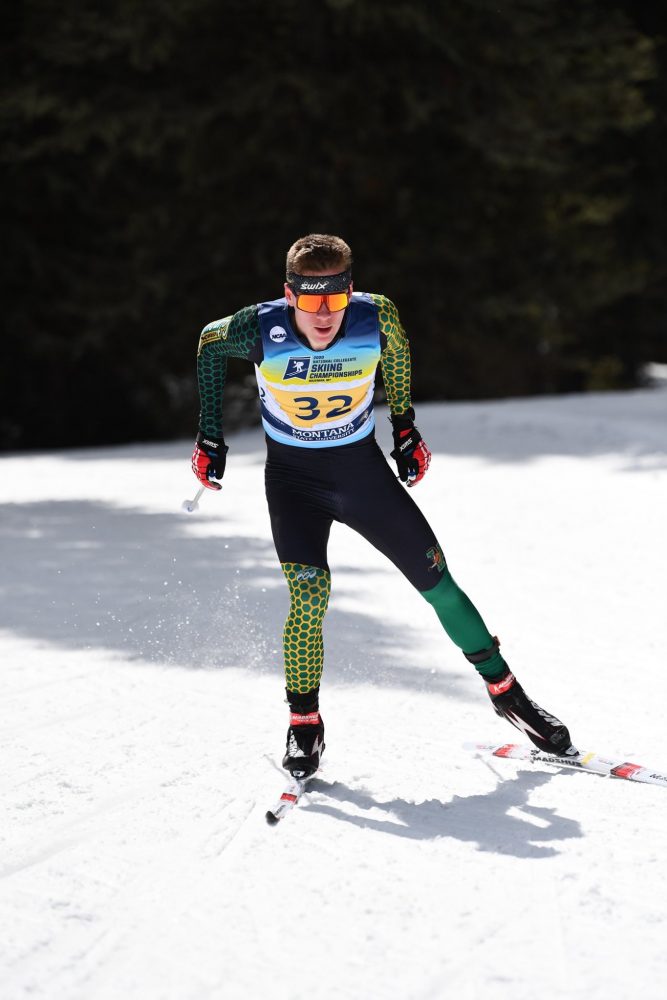This is the second installment of a two-part interview. You can read the first installment here
FasterSkier: You’ve now spent a lot of time racing in the US at a very high level, both in college, and for Rossignol. You’ve also done a lot of racing in Switzerland before that. What are the major differences in ski racing between the two countries?
Karin Camenisch: In college [in Denver], I thought the [US] athletes were more relaxed about racing. Before the race and after the race, we were all good friends. I think that would never happen in Switzerland, or not in the same way.
FS: Do you think that’s a good thing, a bad thing, or just a different thing?
KC: If you have the right balance, I think it’s a good thing. I think if you are too serious, you won’t race fast. You need to be relaxed, to have fun, but also to turn on that switch in your head when you get to the starting line. You need to say, “OK, now it’s serious. And I have to go.â€
FS: From watching you race, you seem to be pretty good at that. Before the race, after the race, you’re friendly, want to talk, hang out, but then once you get on the course, your game face is on.
KC: Thanks…I think that’s how it should be, and that’s something I learned in college. I definitely think I was too serious when I got to the U.S.
FS: It obviously didn’t hurt you at all, because you went on to win a team NCAA championship, and won US nationals.
KC: Maybe that’s just because I’m still competitive enough; I still want to win the race, not just to hang out with my friends. Something else that is different at home is that you are able to race internationally almost every weekend. Especially at a young age, you are exposed to skiers from other countries, and you can witness how they are, or how they ski, their technique. I still remember my first race in France. It was a big deal, because this was my first time in a different country. I was 14 or 15, and I think that’s pretty early to race in a different country.
FS: It’s not something that — maybe other than Canada —most kids would get in this country.
KC: I think you need that. When you are young, you need to see your competitors. You need to know how far away you are, or how far ahead you are. So you know that you have to go home, and you have to work hard. You realize that other people, they are not sleeping either, they are training hard like you do.
FS: And that sort of leads into the development of skiers and how it’s different. In the US we have a bunch of really fast skiers internationally now, but we’d obviously like to have more. After your time in the US, do you see anything that makes you say, “This is one of the reasons why the US hasn’t been as competitive as European nations?â€
KC: One problem is that the country is so big. And you guys are on the other side of the pond, so you don’t have a chance to race against other countries except the Canadians. There is always a lot of traveling involved. If I go, say, to Germany to race, the drive is not usually more than 4.5 hours. In the US, if you want to go from Bozeman to Salt Lake, you maybe drive 7 hours, 8 hours. I guess it’s unfortunate for the US, that it’s not that easy to drive 5 hours and then ski with Canadians and Mexicans and whatnot.
FS: I know that that’s why Mexico hasn’t been competitive in the Olympics, because the travel’s been too far…
KC: Yeah, I might go down there and coach.
FS: You could bring Mexico to the Olympics. I would enjoy that.
KC: Back to the question about US development…I definitely think that you guys are on the right track, with all the regional and club teams. You have to work on the regional levels. And if you do the work right there, the national team will be able to pick and choose from a lot of young athletes. Especially when you are young, in your high school and then college, you don’t have time to travel. I don’t think it’s good for young athletes. They should just stay at home and be able to do what they love in their environment. I think it’s important that you have qualified coaches on regional levels, and that maybe different regions work together. Exactly how you guys have it now. Have races in different regions throughout the season, and then at the end of the season have one big finale. I think if the work has been done right in those regional teams, then when athletes move up to the national team they just have to refine their skills and that will bring them to the next level, hopefully the international level.
FS: Right, because once an athlete moves up to the national team, in some ways it’s too late for many things. They need to have a strong history in the sport, by the time they get there.
KC: Exactly. I think it’s also important for young kids to have a life besides skiing: if it’s playing an instrument or drawing or some other sport, having that is really important. They shouldn’t just focus on skiing. If they’re really talented in skiing, or if they really like it, they can still do that when they are older.
FS: Some people say that if you want to be an elite level cross-country skier, that by the time you’re 15 you need to be training year round for cross-country skiing. So it doesn’t mean that you can’t play a musical instrument, or be an artist, or do something else, but that in terms of athletics, you’re focusing your training on skiing.
KC: I know what you’re saying, and I know a lot of people believe that, and I guess I’m a total exception. I’m thinking about myself and my experiences.
FS: You were more well-rounded? You didn’t exclusively start skiing when you were 14 or 15?
KC: Yes, and I would do it again. I think you should be a well-balanced athlete, but also a well-balanced person. I believe that you can still race fast without spending the summer only training on roller-skis. I think you can just run, or if you like to mountain bike, head up the mountain. You are still training. I think it can be later — when are you done with high school maybe?
FS: 17, 18. Most people are starting college at 18.
KC: I definitely think that if you enter college, then you can concentrate on whatever sport you want. You can play soccer or ski or whatever, and most of the time you don’t have time for anything else because you’re in school. But in high school, I would definitely recommend kids should do whatever they like. If they want to play soccer in the fall, they should play soccer. Who cares if they are not top in skiing? If they really want to do it, I think they could get up to that level later on.
FS: Some people agree with you completely on that, and some, as I said, believe that if you’re not specializing by the time you’re 14, it’s too late. And I would guess that for some people, one would work and not the other. Some people have to specialize early for whatever reasons, and for some people, if they specialize too early, they burn out and are out of the sport by the time they are 22.
KC: Exactly, and I think that’s a big problem. I’ve seen it here in Switzerland. All my friends — they’ve quit. From my age, born in 1980, I’m the only skier left.
FS: In your region?
KC: In Switzerland. I’m one person. Can you believe that?
FS: That’s crazy.
KC: Most of them got burned out, or their parents pushed them, so they quit because they just didn’t like it anymore. I think one reason why I’m still skiing is that first of all I still like it, but also maybe because I mixed it up when I was younger. I did a lot of mountain biking, and quite a bit of running, and I also competed in running as well as on the mountain bike in the summer. And that just made it more interesting to me. And exactly what you said: if I had started roller-skiing in May, when I was 15, I would have hated it by August, and I’m still a little bit the same like that. I still don’t like roller-skiing. So I try to push it out and not start until June or July. Otherwise I would be totally bored and burned out by September. Another thing is that injury wise, I’ve been really lucky. I’ve had only one shoulder injury, and that happened when I went alpine skiing, so that was just stupid; otherwise, I’ve never had any overuse injuries. I think one reason for that is I changed sports or did a lot of different things at the same time, so I didn’t use the same muscles all the time.
FS: Karin, thank you so much. It’s always a pleasure to talk to you!
Related on FasterSkier.com:
http://www.fasterskier.com/news4585.html




